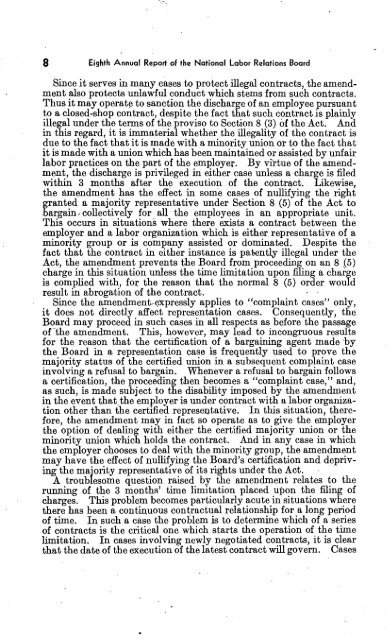1943 - National Labor Relations Board
1943 - National Labor Relations Board
1943 - National Labor Relations Board
Create successful ePaper yourself
Turn your PDF publications into a flip-book with our unique Google optimized e-Paper software.
8 Eighth Annual Report of the <strong>National</strong> <strong>Labor</strong> <strong>Relations</strong> <strong>Board</strong>Since it serves in many cases to protect illegal contracts, the amendmentalso protects unlawful conduct which stems from such contracts.Thus it may operate to sanction the discharge of an employee pursuantto a closed-shop contract, despite the fact that such contract is plainlyillegal under the terms of the proviso to Section 8 (3) of the Act. Andin this regard, it is immaterial whether the illegality of the contract isdue to the fact that it is made with a minority union or to the fact thatit is made with a union which has been maintained or assisted by unfairlabor practices on the part of the employer. By virtue of the amendment,the discharge is privileged in either case unless a charge is filedwithin 3 months after the execution of the contract. Likewise,the amendment has the effect in some cases of nullifying the rightgranted a majority representative under Section 8 (5) of the Act tobargain , collectively for all the employees in an appropriate unit.This occurs in situations where there exists a contract between theemployer and a labor organization which is either, representative of aminority group or is company assisted or dominated. Despite thefact that the contract in either instance is patently illegal under theAct, the amendment prevents the <strong>Board</strong> from proceeding on an 8 (5)charge in this situation unless the time limitation upon filing a chargeis complied with, for the reason that the normal 8 (5) order wouldresult in abrogation of the contract.Since the amendment-expressly applies to "complaint cases" only,it does not directly affect representation cases. Consequently, the<strong>Board</strong> may proceed in such cases in all respects as before the passageof -the amendment. This, however, may lead to incongruous resultsfor the reason that the certification of a bargaining agent made -bythe <strong>Board</strong> in a representation case is frequently used to prove themajority status of the certified union in a subsequent complaint caseinvolving a refusal to bargain. Whenever a refusal to bargain followsa certification the proceeding then becomes a "complaint case," and,as such, is made subject to the disability imposed by the amendmentin the event that, the employer is under contract with a labor organizationother than certified representative. In this situation, therefore,the amendment may in fact so operate as to give the employerthe option of dealing with either the certified majority union or theminority union which holds the contract. And in any case in whichthe employer chooses to deal with the minority group, the amendmentmay have the effect of nullifying the <strong>Board</strong>'s certification and deprivingthe majority representative of its rights under the Act.A troublesome question raised by the amendment relates to therunning of the 3 months' time limitation placed upon the filing ofcharges. This problem becomes particularly acute in situations wherethere has been a continuous contractual relationship for a long periodof time. In such a case the problem is to determine which of a seriesof contracts is the critical one which starts the operation of the timelimitation. In cases involving newly negotiated contracts, it is clearthat the date of the execution of the latest contract will govern. Cases
















